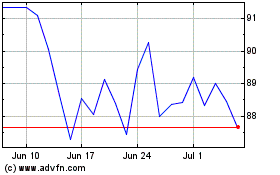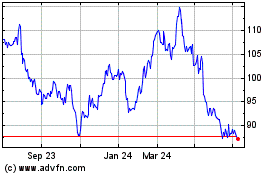SHANGHAI—China's foreign-car factories, once among the world's
busiest, are starting to slack off.
New weakness in the world's largest car market has led companies
such as General Motors Co. and Volkswagen AG to run their plants
there at less than full capacity for the first time, according to
industry data.
The global auto makers, which have been some of the biggest
beneficiaries of Chinese consumers' increasing appetite for upscale
goods, have already announced a slowdown in sales there as the
economy cools. Though the auto makers expect the market to grow
over the long-term, the production curb suggests the easy boom
times are over, signaling a bumpier ride for global companies that
made large bets on soaring Chinese demand.
During the first half of 2015, the aggregate utilization rate of
23 significant car-making joint ventures—China requires foreign
companies to build cars with local partners—fell below 100% for the
first time, averaging 94.3% utilization versus 107.4% a year
earlier, according to a study by Sanford C. Bernstein. Plants are
able to exceed 100% capacity utilization by adding extra work
shifts to meet high demand.
SAIC General Motors, a joint venture between GM and China's
largest auto maker SAIC Motor Corp., built 2.4% fewer cars in the
first half of the year compared with a year earlier, according to
data from the China Passenger Car Association, a trade
organization. FAW-Volkswagen Automobile Co., one of Volkswagen's
joint ventures in China, produced 1.2% fewer cars over the same
period.
Volkswagen's joint venture with SAIC was one of only three
manufacturers to increase capacity utilization during the first
half, according to Bernstein.
"From July through year-end we can have 10 days off a month. We
were usually given two days off [a month]," said Eric Shi, an
engineer for a General Motors plant in Shanghai, who said he used
to work a lot of weekends. "The situation seems worse than that of
2008" during the global financial crisis.
SAIC GM, owner of the plant, directed inquiries to GM's Chinese
headquarters, which said it manages production volumes to maintain
inventories within a healthy range, and it is closely monitoring
market conditions.
Global car makers such as GM, Volkswagen and BMW AG have been
particularly sensitive to slowing China growth because after years
of chasing rising sales there, they now get a significant amount of
their revenue from the country. China accounts for 35% of the
Volkswagen group's global vehicle sales, 35% of GM's and 20% of
BMW's, according to the companies' corporate filings.
China passenger-vehicle sales fell for a second consecutive
month in July, registering a 6.6% year-to-year decline. Sales of
foreign branded cars fell 1.5% in the first half from a year
earlier, compared with a 4.8% year-to-year rise in the overall
Chinese car market—a disappointing growth figure compared with
booming double-digit percentage growth in prior years.
The percentage declines in production are in line with
first-half losses in sales volumes. SAIC GM shipped 4.8% fewer cars
to dealers compared with a year earlier, and the Volkswagen
group—the No. 1 foreign car maker in China by sales volume—sold 4%
fewer cars in China. Volkswagen generates more than half of its
profit in the country.
Global car makers have built more plants in China than anywhere
else since 2008, but now they are canceling shifts and curtailing
hours, as well as increasing incentives for dealers and cutting car
prices.
Car makers reap big profits if their factories run near 100% of
capacity, but their losses mount rapidly if the utilization rate
falls below 80%.
Companies such as Volkswagen and GM are now slashing prices to
boost sales. In the second quarter of this year cars in China were
sold at a discount of more than 10%, compared with 7% a year
earlier, according to Ways Consulting, a Guangzhou-based consulting
firm focused on the Chinese automotive industry.
The plants are still operating near full capacity and the
industry is still profitable, so the companies are nonetheless
planning to add capacity, banking on continued growth in China,
albeit at a slower pace.
GM plans to raise its capacity in China to five million vehicles
a year by 2018 from about 3.5 million now. Volkswagen intends to
raise its China capacity to five million vehicles a year by 2019, a
rise of more than 40% from current levels. Toyota Motor Corp. is
spending $440 million to add a manufacturing line to an existing
facility in China, while Hyundai Motor Co. is building two new
plants in the country, each with an annual production capacity of
300,000 vehicles.
"We expect a more volatile market in China as growth moderates,"
a spokeswoman for GM said. "It hasn't changed our long-term view of
China. We continue to believe that the market will grow."
A Ford spokeswoman said: "Given the overall industry slowdown in
China, we have made production adjustments to balance supply and
demand." Ford's China capacity doubled to more than 1.2 million
vehicles in the past three years.
VW didn't immediately respond to a request for comment.
Bill Peng, a Beijing-based partner with Strategy&, the
global strategy consulting team at PricewaterhouseCoopers, said
many auto executives made expansion plans based on an expectation
that at least 30 million cars could be sold in China per year by
2020. But he said that with the economic slowdown making that
target look challenging, companies that haven't expanded yet should
think twice.
"If their products or managing executives are not overwhelmingly
competitive, cutting production will be inevitable when the
factories are completed," he said. "It's time for foreign car
makers to consider how to control cost."
Rose Yu
Access Investor Kit for "Toyota Motor Corp."
Visit
http://www.companyspotlight.com/partner?cp_code=P479&isin=JP3633400001
Access Investor Kit for "Toyota Motor Corp."
Visit
http://www.companyspotlight.com/partner?cp_code=P479&isin=US8923313071
Subscribe to WSJ: http://online.wsj.com?mod=djnwires
(END) Dow Jones Newswires
August 23, 2015 22:05 ET (02:05 GMT)
Copyright (c) 2015 Dow Jones & Company, Inc.
Bayerische Motoren Werke (TG:BMW)
Historical Stock Chart
From Mar 2024 to Apr 2024

Bayerische Motoren Werke (TG:BMW)
Historical Stock Chart
From Apr 2023 to Apr 2024
